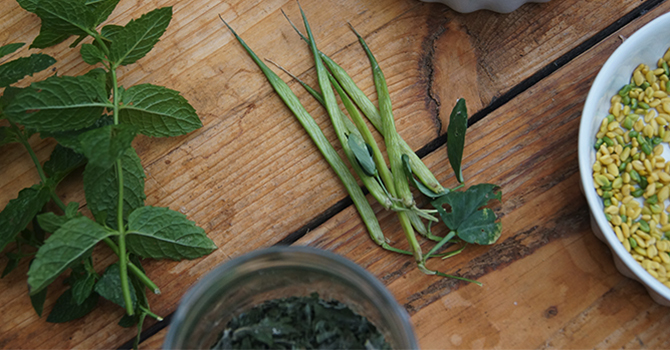Discovering Your Kitchen’s Unsung Heroes: Using Food as Medicine

Natalie Manitius
MPH Candidate, Nutritional Sciences
When I was growing up, my family's medicine cabinet looked like any other — stocked with Tylenol, Motrin, and Pepto-Bismol. But behind the flashy labels was a league of lesser known health warriors; from Amol, a European-made blend of herbal oils, to sage tea, a panacea for stomach aches, to valerian root, an extract for improving sleep, it seemed there was an alternate remedy for nearly every ailment.
If I had a cold, my dad prepared a vapor inhalation of Amol, which my family joked about being able to cure any ailment. If my stomach hurt, I was given sage tea. If I couldn't sleep, a dash of valerian root did the trick.
With each pungent tincture and mysterious bottle, I was learning food as medicine—the idea that food, when used properly, has the power to heal. Although this movement has been gaining popularity in recent years, it dates back to ancient times: Hippocrates—the father of medicine—is also famed for founding the 'food as medicine' philosophy.
It's easy to forget that before medicine, as we think of it, existed, food was our primary medicine. Many widely used medications originated from plants: Aspirin owes its success to willow bark, morphine to the opium poppy, and the malaria-curing quinine to the cinchona tree. Just as grandmothers insist on chicken soup for the common cold, there is a kind of 'ancient wisdom' tucked within these food prescriptions.
If someone looked into my medicine cabinet today, they'd likely wonder if some cosmic magic was afoot. But while some of these remedies might be based in old wives' tales, there is scientific evidence supporting their use.
For individuals under prescription care, consult your doctor before experimenting with herbal therapies. For the skeptics in the audience, or those that might just want to give some food remedies a shot, here are three evidence-based therapies to try at home:
1. Manuka Honey
Manuka is one of the mightiest honeys on the market. Produced in New Zealand from bees pollinating the Manuka bush, this form of honey has been shown to reduce gingivitis, inhibit H. Pylori, and even defeat the menacing MRSA, as it contains major antibacterial compounds.
Buying a high quality honey is key to its efficacy, and Manuka honey uses a graded system called Unique Manuka Factor, or UMF, to decode its strength. The UMF system runs on a scale of 10 to 25, which refers to its level of potency, and ensures that the product isn't adulterated.
Next time you have a cold, consider Manuka as your line of defense. Take 1 tsp daily, without heating the honey, as heat will destroy the active enzymes. Manuka is not advisable for infants, individuals with blood sugar issues, or severely allergic individuals.
2. Ginger
Remember when your parents gave you ginger ale when your stomach was upset? That's the idea here. Research on ginger supports its use in cases of nausea, and in trials where pregnant women were randomized to consuming ginger, they fared better than their ginger-free counterparts.
Ginger is also being explored as a potential agent against cancer. Research by Michigan's very own Suzie Zick demonstrates that ginger inhibited growth of ovarian cancer cells.
Other studies suggest its potency with breast cancer inhibition.
To add ginger to your medicinal repertoire, start with freshly grated ginger root. Next time you feel a wave of nausea sneak up, peel and grate 1 tsp- ½ tbsp. and boil it into hot water for an extra gingery zing.
3. Lavender
There's a reason lavender is often wafting from spas—it's known for its calming effects. As lavender inhibits the sympathetic "fight or flight" response, this one's for the anxiety prone and the fitful sleepers---research supports its use as an anti-anxiety measure and for promoting sound sleep.
If you find stress creeping up, rub a few drops of lavender essential oil on your temples or the back of your ears—I've been known to do this in airport terminals. If you're not an oil fan, try a lotion, hand soap, or even a tea blend of chamomile and lavender.
If you're still not convinced, consider these resources for further research: An overview on supplements by RxList, this evidence-based guide to complementary and alternative medicine, HerbMed's database, or this Natural Medicine guide.
Food as medicine is grounded in the idea that foods work with your body to fight off illness, mobilizing your body's innate defenses. The next time you feel a scratchy throat coming on, or a stressful event in your wake, consider putting nature's medicines to the test.
- Learn more about Nutritional Sciences at Michigan Public Health.
- Interested in public health? Learn more here.
About the Author
 Natalie Manitius is a second year MPH student in Nutritional Sciences originally from the D.C. metro area. Natalie's road
to nutrition was paved by her experience in food journalism and organic food advocacy,
as well as a health experience that was transformed through diet and nutrition. Her
interest areas are in holistic health, sustainability, food waste, and circular economies,
and she is currently working on a Dow Sustainability Fellowship to improve Ann Arbor's
composting program. Natalie is passionate about food system reform, and looks forward
to a career delivering social impact in the food industry.
Natalie Manitius is a second year MPH student in Nutritional Sciences originally from the D.C. metro area. Natalie's road
to nutrition was paved by her experience in food journalism and organic food advocacy,
as well as a health experience that was transformed through diet and nutrition. Her
interest areas are in holistic health, sustainability, food waste, and circular economies,
and she is currently working on a Dow Sustainability Fellowship to improve Ann Arbor's
composting program. Natalie is passionate about food system reform, and looks forward
to a career delivering social impact in the food industry.
